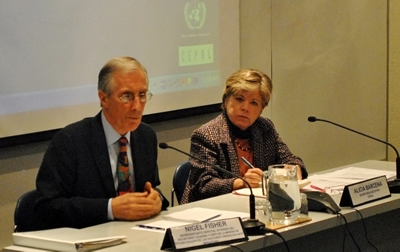Head of MINUSTAH Presented the Road Map for the Mission over the Next Few Years
Topic(s)
Nigel Fisher gave details of the Consolidation Plan of the United Nations Stabilization Mission in Haiti (MINUSTAH).

(21 May 2013) Following nine years of operations in the Caribbean country, the United Nations Stabilization Mission in Haiti (MINUSTAH) is implementing a Consolidation Plan to assess, in conjunction with the Government, a gradual withdrawal of troops stationed on Haitian territory, according to Nigel Fisher, the Secretary-General's Special Representative, Ad Interim, and Head of MINUSTAH, speaking on Monday 20 May.
As part of a tour of Brazil, Chile, Argentina and Uruguay, Mr. Fisher delivered an address on the mission's activities and Haiti's development challenges at the headquarters of the United Nations Economic Commission for Latin America and the Caribbean (ECLAC) in Santiago, Chile.
The senior official, who is from Canada, was welcomed by the Executive Secretary of the Commission, Alicia Bárcena, who reiterated ECLAC's commitment to the island's development. She said "we believe that ECLAC can make a contribution, particularly with the Haitian Institute of Statistics and Information Technology, towards carrying out the Population Census in conjunction with Mexico's National Institute of Statistics and Geography (INEGI)".
Ms. Bárcena emphasized that "having a population census is essential for implementing a strategic development proposal capable of building a vision of Haiti for the future". She added "Haiti is a daily reminder of the importance of the role of the State, the public sector, international cooperation and relations with social agents".
According to Mr. Fisher, the current situation in Haiti is radically different from the one in 2004 when MINUSTAH began and the country was on the brink of civil war. He highlighted progress in terms of security that was "greatly appreciated by the local community", as well as advances in terms of consolidating democratic institutions and strengthening the rule of law.
Speaking to an audience of United Nations officials, academics and diplomats, Mr. Fisher pointed out that "This does not mean that all the problems have been resolved". He said that 80% of the population in Haiti live in poverty, and the institutions remain fragile with limited resources in order to operate.
The senior official stated that the earthquake that struck the island on 12 January 2010 was a major blow for progress made, and this had affected the exit strategy of MINUSTAH, which has played a key role in the reconstruction process.
Mr. Fisher, who took office on 1 February 2013 to replace Chile's Mariano Fernández, also said he appreciated the role of Latin America in the functioning of MINUSTAH, as almost 70% of the blue helmets in Haiti were from the region's countries.
In his view, the main problems facing the island include mistrust among the political classes and the lack of consensus around a national project. The immediate challenge is the municipal elections and by-elections that should have been held in 2011.
In this regard, he described recent meetings between the Haitian Government and opposition leaders, who stated a willingness to take part in the next elections (which is a very encouraging sign for the country).
He also declared that the national authorities have an ambitious plan to promote investment in the country, with attractive terms on offer.
Mr. Fisher explained that the Consolidation Plan for gradual troop withdrawal has four components. They are the consolidation of the rule of law and the respect for human rights; strengthening of the Haitian National Police (reaching 15,000 members by 2016); gradual transfer of electoral management to the national authorities; and extending governance through local capacity building and the negotiation of political agreements.
He said "these objectives have been endorsed by the Government of Haiti and a joint working group has been set up to monitor progress". The target is to withdraw troops responsibly, to avoid having to set up another mission in the future. According to the Head of MINUSTAH, if the assessment of the plan is successful, there will be a 50% reduction over three years.
Mr. Fisher concluded by explaining that the reduction is subject to annual review of the mandate and the Consolidation Plan of MINUSTAH by the United Nations Security Council.
ECLAC Public Information and Web Services Section.
E-mail: prensa@cepal.org; Telephone: (56 2) 2210 2040.
Follow us on: Twitter, Facebook, Flickr and YouTube.
Country(ies)
-
Haiti
Contact
Public Information Unit
- prensa@cepal.org
- (56 2) 2210 2040